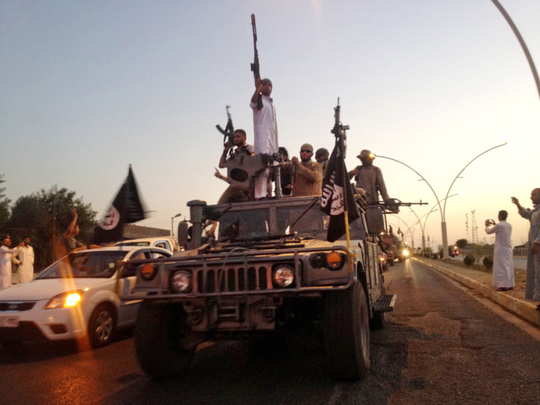
The horrific beheading of 21 Egyptian Copts and combatting Daesh (the Islamic State of Iraq and the Levant) was the topic that dominated headlines in the region’s newspapers.
Commenting on the issue, the UAE’s Al Khaleej said the Arab nation must mobilise its efforts to defend its existence, religion and culture against the dangers of terrorism. “The killing of 21 Egyptians in Libya must set alarm bells ringing for all Arab and Muslim nations and peoples, because it indicates how much the danger of terrorism is spreading. This terrorism is targeting the Arab and Muslim nation and our great religion. Condemnations are only talk, and bloodshed is on the rise in Syria, Libya and Iraq. It is necessary to make decisions and take decisive steps to completely eradicate this cancerous presence from its roots. It is time for Arabs to mobilise and to overcome differences, conflicts and interests that have led to divisions in the Arab nation and in turn to such terrorism.”
Jordan Times noted that direct Egyptian military involvement against Daesh widens the circle of Arab military response to the growing dangers of this extremist group.
“The fact that Daesh was able to establish bases in Libya proves that wherever there is a failed state, as in the case of Libya, Yemen and Syria, or political instability, as in Iraq, this murderous group and its affiliates immediately fill the vacuum and establish footholds from where they launch their vicious actions against innocent people, Muslims and non-Muslims alike, claiming to do so in the name of religion, rendering a big disservice to Islam. Therefore, the best way to stem Daesh’s advances in the Arab countries would be to avoid at all costs allowing their domestic situation to reach the level that qualifies them as failed states.”
In it’s editorial, Lebanon’s Daily Star noted that this community of terrorists is irreligious, whatever its members might claim, and sees among its victims no difference in Muslims, Christians, Jews or atheists. “Mere condemnations and hasty short-term measures are insufficient now. This dangerous menace has shown it has no qualms about destroying innocent lives wherever it can derive even the smallest semblances of support. What is crucial now is that these gaps must be filled, so that Isis [Daesh] and its affiliates are no longer allowed to manipulate local conditions to their benefit — be those geographical, economic, political or social. And this effort needs the support of the United Nations, and all its member states, with as much strength and unity as was displayed by the allies facing the Nazis threat in the Second World War.”
Daesh’s practice of filming and distributing its barbaric crimes has united all religions against the organisation and has further highlighted the importance of combatting terrorism that distorts the image of Islam and Muslims, said UAE’s Al Bayan. “There is a consensus in the international public opinion about the need to respond with force to Daesh’s crimes, which have nothing to do with Islam or human values. The group is more of a militia than a religious organisation, particularly because of its methods of brutality and oppression that leave no room for social or political stability. The barbaric murder of innocent people is a despicable act committed by Daesh, an organisation that carried out many other atrocities against people in the region.”




_resources1_16a31069e4e_small.jpg)




